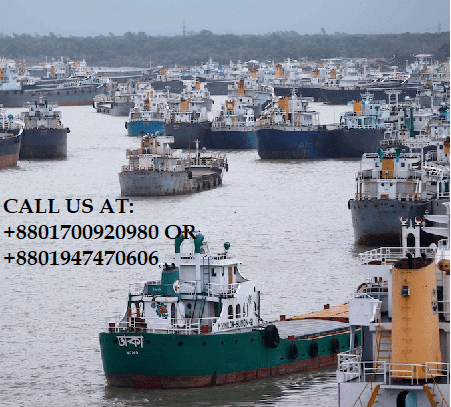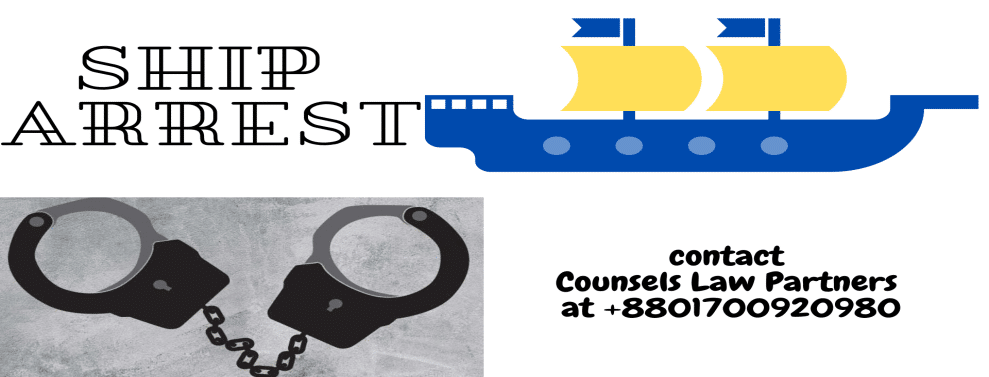Contents
- 1 Legal advice on Maritime, Admiralty, and Ship Arrest in Bangladesh
- 2 Admiralty and Maritime Court in Bangladesh
- 3 Possession or ownership of a ship
- 4 Damage is done by the Ship
- 5 Ship Arrest in Bangladesh
- 6 Legal Advice regarding Admiralty, Maritime, and Ship Arrest by CLP:
- 7 Frequently Asked Questions (FAQ)
Legal advice on Maritime, Admiralty, and Ship Arrest in Bangladesh
This article will focus on the laws related to Maritime, Admiralty, and Ship Arrest and the legal services available for these areas of law in Bangladesh. The most common concern related to admiralty and maritime matters is regarding the jurisdiction of the Admiralty Court.
In other words, for what cause of action one takes resorting to the admiralty court is one of the frequently asked questions.
Hence, this article will give a clear overview of Maritime and Admiralty law and will provide guidelines on the steps that one can take to prevent oneself from facing any issue related to these areas of law. In addition, will also guide those already facing issues related to shipping or any contracts, torts, injuries, other offences, etc that take place on any navigable water.
Admiralty and Maritime Court in Bangladesh
Currently, in Bangladesh, the laws related to Admiralty and Maritime are dealt with Admiralty Act 2000. The High Court Division of the Supreme Court of Bangladesh has an original jurisdiction to deal with the cases of admiralty that extends to ships or vessels anchored at any port in Bangladesh.

Admiralty Court Jurisdiction:
The Admiralty Court has jurisdiction to hear and determine any of the questions or claims about:
- the possession or ownership of a ship
- any question arising between the co-owners of a ship as to possession, employment, or income of that ship;
- any claim in respect of a mortgage of or charge on a ship or any share therein;
- any claim for damage done by a ship;
- any claim for damage received by a ship;
- any claim for loss of life or personal injury sustained in consequence of any defect in a ship
- any claim for loss of or damage to goods carried in a ship;
- any claim arising out of any agreement relating to the carriage of goods in a ship or to the use or hire of a ship;
- any claim like salvage of life from a ship
- any claim in respect of towage of a ship or an aircraft;
- any claim for forfeiture or condemnation of a ship or of goods
Mode of Exercise:
The admiralty jurisdiction of the High Court Division may be exercised in personam and action in rem along with some conditions. The Admiralty Jurisdiction of the High Court Division as the Court of Admiralty may be exercised through an action in rem against the ship, aircraft, or property.
Institution of Suit :
An action or a suit before the High Court Division shall be instituted by a plaint drawn up subscribed and verified according to the Code of Civil Procedure, 1908. As per section 7 of the Admiralty Act 2000, the maximum court fee for Admiralty suits is Taka 1,00,000 (One Lac), except the claims by the master or seamen for wages earned on board.
Enforcement of Judgment:
The Hon’ble Court upon satisfaction on a well-founded case may enforce the payment of the judgment by attachment against the party on whose behalf a caveat has been entered, and by the arrest of the property if no caveat has been entered.
An order of sale by the Hon’ble Court will be conducted by the Marshal in a manner as a sale of moveable property in execution of a decree in an ordinary civil suit unless the Hon’ble Court otherwise orders.
In practice, if a bank guarantee is provided, it will be en-cashed in favour of the judgment debtor. Foreign judgments and arbitration awards are also enforceable by the Hon’ble Court.
Protection from Litigation under Admiralty Court
Admiralty law is mostly applied in Shipping Industries. For the smooth running of the business, companies need to comply with laws, rules, and regulations related to Admiralty and Maritime.
Therefore, to maintain compliance with the laws, parties can approach the lawyers to negotiate and draft agreements in a manner that will serve the purpose of the parties.
The agreement should include terms for all events including unforeseeable events that can arise during the performance of the contract. The most important contracts in the shipping industries include the sale and purchase agreements of ships and vessels, agreements for transportation service, agreements on ship management, Vessel rent agreements, export and import agreements, Marine Insurance agreements, Seafarer’s Employment agreements, and agreements for Freight Forwarding, etc.
Possession or ownership of a ship
Possession or ownership of a ship involves legal rights and responsibilities about a vessel. Ownership is usually established through a sale and purchase agreement, which must be carefully negotiated and drafted to include clear terms on payment, quality, obligations of both parties and remedies in case of breach.
Ensuring the authenticity of ownership documents, such as the registration certificate and log book, is crucial to prevent future disputes. In case of issues like the ship being hypothecated to a bank by a previous owner, legal proceedings can be initiated in the Admiralty Court for resolution, including the potential arrest of the ship to secure the necessary documents and titles.

Prevention from Litigation
To curtail future disputes regarding the possession and ownership of a ship, the parties need to negotiate every term relating to the Ship Sale and Purchase agreement.
In addition, the agreement must include terms that will act as a shield for buyers and sellers. The contract must also specify the obligations of buyer and seller, terms on payment, quality and material used in building the ship, termination clause, and the remedies available to buyer and seller in case of a breach, etc.
While purchasing ships, the documents proving the ownership of the seller must be sought and verified by the lawyers so that the purchaser is safe from any trouble arising in the future.
Legal action under Admiralty Jurisdiction
Generally, the most common issue that arises about possession or ownership is that often after buying the ship the purchaser finds that the ship has been hypothecated to the bank by the previous owner. In that situation, the bank and the purchaser can initiate proceedings in rem in the Admiralty Court.
They can also apply for ship arrest for recovery of documents of title and ownership of a ship, including registration certificate, log book, and such certificates as may be necessary for the operation or navigation of the ship.
Damage is done by the Ship
Prevention from Litigation
For the prevention of any collision at sea, there are collision regulations that must be complied with by the owner or master of every ship, sailing vessel, or fishing vessel. In addition, the ship will not carry or exhibit any lights or shapes or use any fog signals other than those required by the said regulations.
In the shipping industry, causalities caused by natural or man-made perils in which ships sustain or cause damage to another ship or the goods in the ships are very common.
As such marine insurance is essential in the shipping industry. Marine insurance covers the loss or damages of ships, cargo, terminals, and other transport by which goods and commodities are transferred, acquired, or held between the points of origin till the delivery point.
Therefore, marine insurance gives protection to the ship or goods from any damages or uncontrollable events.
A marine insurance contract is a contract between the insurer and the ship owner or the supplier of the goods whereby the insurer agrees to compensate or indemnify the aggrieved party against marine losses or damages.
Therefore, such a contract should be made very carefully keeping in mind all kinds of situations that can arise and prevent the aggrieved from being indemnified. However, while forming the contract it should also be kept in mind that the insurance money cannot be taken by committing fraud.
A marine insurance contract shall include elements like general contracts, insurable interest, indemnity, paramount good faith, proximate cause, subrogation, warranties, assignment and nomination of the policy, return of premium, etc. However, the proposal for marine insurance can be made by a broker or insurer.
Legal steps to be taken for damage done by Ship
When a ship has sustained or caused any accident, the owner or master of the ship shall within three days after the happening of the accident, damage, or casualty or as soon thereafter as possible, transmit to the Director-General of shipping a report of the accident or damage and of the probable cause thereof with all other relevant information.
In case of any accident with a foreign flag ship in Bangladesh waters, the agent of the ship shall within 24 hours after the occurrence of the accident or occurrence of the incident transmit to the Director-General a report of the same.
If any person fails to comply with these requirements, he will be liable to a fine which may extend to fifty thousand takas.
For any damage caused by the ship, the aggrieved party can apply for ship arrest. A detailed discussion on ship arrest has been discussed below.

Defect In Ship
In the shipping industry, one of the important contracts made by the ship owners regarding seaworthiness is the agreement of ship management.
In the past, the ship owners used to be involved in management like financial management of vessels, employment, maintenance of vessels, technical supervision, operation, etc.
However, now third parties such as ship management companies are hired to manage the operation of the ship. Such a contract needs to be made very carefully as the third parties involved in the management are responsible for the condition of the ship and keeping the ship fit for its job.
Therefore, the contract needs to include all relevant terms possible with a clear mention of what responsibilities related to management are assigned to the third party.
The contract should also state the circumstances in which each party will be responsible for the defect in the ship due to lack of proper maintenance.
It should also state when the owner will be responsible for any detection in the ship even after delegating the management responsibilities to the third party.
Maritime Lien
Under sections 477 and 478 of the Bangladesh Merchant Shipping Ordinance 1983, the maritime lien for seaman wages etc has been recognized in Bangladesh.
A Maritime Lien is a claim that is usually made when seamen have not received their wages for a long time. In such cases, the court generally orders ship arrest until the wages are not paid.

Ship Arrest in Bangladesh
Ship arrest is quite popular in Bangladesh because Bangladesh is the most advantageous ship arrest jurisdiction. This is because Bangladesh is not a signatory to any arrest convention and ship arrest can be done for a variety of reasons for example ship can be arrested for security, the ship can be arrested in an action in rem, the vessel can be arrested in an action in personam, the ship can be arrested for maritime lien as well as maritime claim, cargo on board or any property belonging to any party can also be arrested by the Admiralty Court, etc.
In addition, the ship arrest is less time-consuming and cheap because the jurisdiction of the court exists 7/24 hours, counter security is not required by the court for arrest and there is no provision or practice of awarding damage for wrongful arrest. Thus, ship arrest is the most convenient option for those aggrieved and who want to resort to admiralty law.
Foreign Ship Arrest
It is noteworthy that a ship can be arrested irrespective of her flag which is within the jurisdiction of Bangladesh. This means that even if the ship belongs to a foreign country as long as it gives rise to an action in rem.
Ship arrest for a maritime lien
For the claim of Maritime Lien, the ship can be arrested even if the owner has been changed and in such cases, the claim survives notwithstanding the change in ownership of the ship.
On the other hand, in the case of a maritime claim, unlike a maritime lien the ship cannot be arrested if, before the filing of the suit, ownership of the ship has changed.
Time and Procedure for Ship Arrest
Documents that are required to be submitted at the time of filling the suit and application for arrest are listed below:
- Power of Attorney executed by the client (notarized and attested by the Bangladesh High Commission in the plaintiff’s country)
- The suit is permitted to be filled by dint of the scanned copy of the Power of Attorney on condition of filing the original after authentication by the Ministry of Foreign Affairs and payment of stamp duty
- All documents necessary to support the claim
- Correspondence between the parties that can support the claim
- Upon receipt of all the necessary documents, it takes 48 hours to obtain an order of arrest.
The original documents as mentioned above are required to be filed at the time of trial.
Procedure for release of the ship from arrest
The easiest way to release a ship from arrest is to issue a bank guarantee by a local bank furnishing it as security. The entire amount claimed needs to be covered by the Bank Guarantee need to cover including interest and costs.
Nevertheless, sometimes the court reduces the amount of security if the defendant can prima facie proof that the claim is overstated.
However, an arrest can be lifted without security if it is established that the vessel has been wrongly arrested and the vessel has no liability to the plaintiff. However, in the case of establishing wrongful arrest, it takes 3(three) to 4(four) days to get the court’s decision on the issue.
It is to be noted that to lift the arrest P&I Club’s LOI/LOU is not accepted but the court allows the LOI if agreed by the claimant to accept it. Upon receipt of the security, the release order can be obtained in a day.
Another option available to the defendant against ship arrest is to contest the arrest. This can be done by filing a caution/caveat. This is done for two reasons one to prevent wrongful arrest by fraudulent claimants and two to minimize the amount of security for the release of the ship by explaining the real story to the court.
Although there is a provision under Admiralty rule to provide undertaking along with caution/ caveat, nowadays that is not required by Bangladesh court.
Legal Advice regarding Admiralty, Maritime, and Ship Arrest by CLP:
The Barristers, Advocates, and lawyers at CLP in Gulshan, Dhaka, Bangladesh are highly experienced at assisting clients through the entire process and legal provisions relating to Admiralty, Maritime, and Ship Arrest in Bangladesh.
For any queries or legal assistance, please reach us at E-mail: info@counselslaw.com
Phone:+8801700920980. +8801947470606. Address: House 39, Road 126 (3rd Floor) Islam Mansion, Gulshan 1, Dhaka.


A very skillful piece of writing. Indeed this provides many useful information regarding Admiralty and I am looking forward to more articles by CLP which would benefit me.
Thanks for your comment.
This article is very informative and was very helpful for me. I really enjoyed reading this excellent piece of writing!
Thanks for your comment.
This article answers all the questions and confusions I had regarding admiralty law in Bangladesh. Thank you so much for this article. It is indeed a very well written article!
Very informative and helpful. Good read!
Great content. Very well defined and put together. Awesome writing
Thanks for your comment.
you are truly a excellent webmaster. The website loading speed is incredible. It kind of feels that you are doing any distinctive trick. Furthermore, The contents are masterpiece. you have done a excellent process on this topic!
Thanks for your comment.